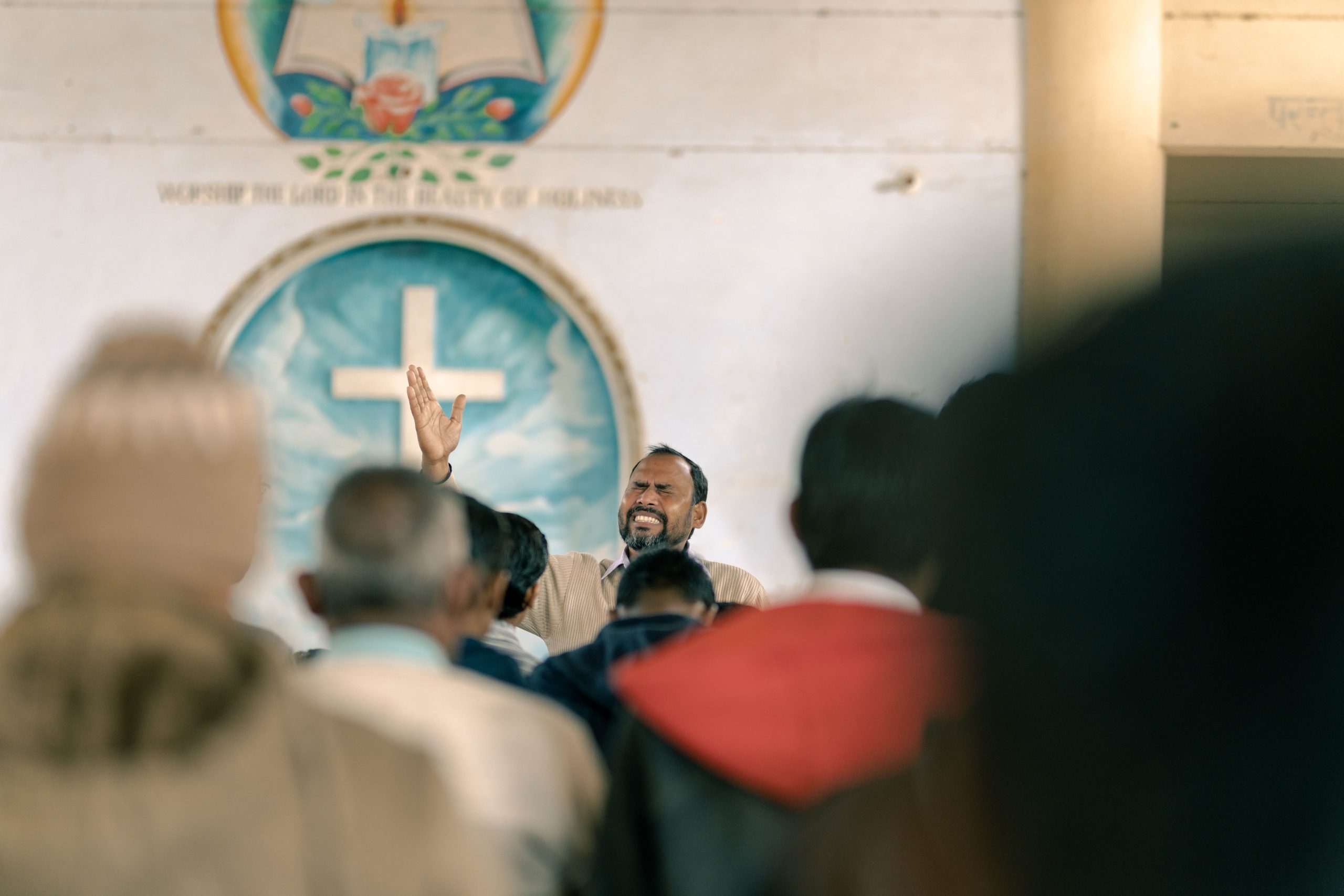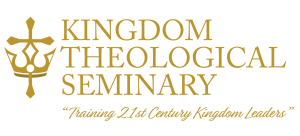MASTER OF DIVINITY

The Master of Divinity is a professional degree in pastoral ministry. It incorporates biblical teachings, theological insights, and concepts for faithful living as well as ministry in a variety of contexts.

The Master of Divinity (M.Div.) is a professional degree for the pastoral profession. It is a high-level degree that provides a well-rounded theological education for anyone seeking a theological education.
the MASTER OF DIVINITY
Do you feel called to full-time ministry? If you are interested in studying the Word of God so that you can help to nurture and grow churches locally and internationally, then the Kingdom Theological Seminary Master of Divinity program is just for you!
The Master of Divinity program provides men and women with comprehensive theological training with a special emphasis on the Kingdom of God. You will also gain practical ministry skills that will assist you in proclaiming the gospel of the Kingdom around the world.
Courses
The Master of Divinity program contains the equivalent of 90 credit hours. These 90 credit hours are comprised of 21 required courses and 9 elective courses.
THEOLOGICAL REQUIRED COURSES
This course is designed to expand one’s exegetical skills through the interpretation of Old Testament narrative. It will expand one’s understanding of genre and the methods used to interpret Old Testament narrative and poetry from a literary perspective. The course is also designed to understand and be able to employ data from ancient Near Eastern culture in the interpretation of Genesis through Malachi. This course will assist the learner in applying Old Testament theology to modern biblical interpretation.
This course is designed to expand one’s exegetical skills through the interpretation of Old Testament narrative. It will expand one’s understanding of genre and the methods used to interpret Old Testament narrative and poetry from a literary perspective. The course is also designed to understand and be able to employ data from ancient Near Eastern culture in the interpretation of Genesis through Malachi. This course will assist the learner in applying Old Testament theology to modern biblical interpretation.
New Testament I will be devoted to surveying the Gospels and the book of Acts. This course is designed to be an introduction to the books of the New Testament, with special emphasis on the life, teachings, and redemptive work of Christ; the founding and growth of the church. On the basis of the biblical text, parallel readings, projects, and lectures, the events and messages of the New Testament will be portrayed against their historical and cultural setting.
New Testament II will be devoted to surveying the Epistles and Revelation. This course is designed to be an introduction to the books of the New Testament with special emphasis on the life, teachings, and redemptive work of Christ; the founding and growth of the church; and the teachings of the epistles and Revelation. On the basis of the biblical text, parallel readings, projects, and lectures, the events and messages of the New Testament will be portrayed against their historical and cultural setting.
This course is designed to give you a concise introduction to the nature, history, and methodology of systematic theology. It will also provide a helpful stimulus in understanding the relationship between the practice of one’s faith and the belief context into which that practice fits. The course will focus on the nature of a theological vision, the inspiration and authority of scripture, the interpretation of those scriptures, and the nature of the God whom we worship.
This course will build upon the theological doctrinal tenets of Systematic Theology I, allowing the learner to gain deeper insights to understanding the basics of theology from redemption to glorification, soteriology, ecclesiology, and eschatology and how these doctrines are applied in one’s personal ministry. Systematic Theology II formulates an orderly, rational, and coherent account of the doctrines of the Christian faith. It addresses issues such as what the Bible teaches about certain topics or what is true about God and His universe. It also builds on biblical disciplines, church history, as well as biblical and historical theology. Systematic theology shares its systematic tasks with other disciplines such as constructive theology, dogmatics, ethics, apologetics, and philosophy of religion.
This course includes a study of the principles of biblical interpretation, an introduction to the major resources available as an aid to biblical interpretation, and an exegetical study of selected passages from the various genres of biblical literature. Some attention is directed to current issues in biblical hermeneutics, but the major focus of the course is practical in nature. The goal of the course is that students develop a sound methodology for exegesis of the biblical texts.
This is a foundational course on biblical interpretation that will provide students with the basic exegetical tools required to interpret the biblical text. The student will learn to recognize and work with the different literary genres of the Bible and will gain an overview of various hermeneutical approaches to scripture. In the process, the student will be introduced to various research tools, methods, resources and practical skills for interpretation in order to appropriate the Bible well in our contemporary context.
This course is an introduction to theories and practices of preaching in pastoral and liturgical settings. In lecture sessions, students will study the various dynamics of preaching (theological, hermeneutical, pastoral, exegetical, ethical, liturgical) and their relation to the regular practice of preaching. In conference/video call sessions and through online forums, students will discuss assignments, participate in workshops, preach, and offer feedback on colleagues’ sermons.
This course is an introduction to Christian apologetics and its relationship to evangelism. The course will teach the biblical, theological, and historical foundations of Christian apologetics. Additionally, the course will serve as a primer for cultural exegesis and cultural hermeneutics. The goal is to equip students with the critical analytical tools to engage contemporary cultural issues as related to matters of faith. Topics include comparative worldview, science and faith, secularism, aesthetics, and ethics. Through required and recommended readings, online discussions, and lectures, the student will gain a clearer understanding of how to navigate and respond pastorally to some of today’s most challenging issues while at the same time formulating a cohesive Christian response to them.
The course will cover the history of Christianity from its inception to the Protestant Reformation of the sixteenth century. We will survey the major movements, doctrines, persons, and institutions that arose within the church and affected its development during this time. Our emphasis will be the development of a doctrinal understanding in the church, as well as careful study of select key individuals whose lives should inspire us to biblical faithfulness today.
The course will cover the history of Christianity and Christian thought from the Protestant Reformation of the sixteenth century to the present. We will survey the major movements, doctrines, persons, and institutions that arose within the church and affected its development during this time. Our emphasis will be the development of a doctrinal understanding in the church as well as careful study of select key individuals whose lives should inspire us to biblical faithfulness today.
This course will explore Christianity in light of cultural distortions and the Kingdom of God. We will examine the modern-day church and how greatly it has been impacted by the historical watersheds of history, beginning with Romanization, followed by Europeanization, Colonization, Westernization, and Americanization of the gospel. The influences of these historical epochs have greatly altered the original message of Jesus and the Kingdom of God in its Jewish context. The church continued to develop but became less Jewish in its interpretation of scripture and more European in its practices and images. This course will also revisit some doctrinal distortions and examine the dispensations of the church and its reformations to help to provide insight and enlightenment into the abuses of the watersheds and the power that the pure gospel of the Kingdom of God offers.
This course (in conjunction with Greek II) offers an intensive introduction to the fundamentals of Greek for the study of the New Testament. It is designed for theological students who wish to move quickly into the study of the Bible in the original languages. The course will focus on introductory grammar and vocabulary of New Testament Greek and will prepare the student for subsequent study of syntax and exegesis.
This course (in conjunction with Greek I) offers an intensive introduction to the fundamentals of Greek for the study of the New Testament. It is designed for theological students who wish to move quickly into the study of the Bible in the original languages. The course will focus on introductory grammar and vocabulary of New Testament Greek and will prepare the student for subsequent study of syntax and exegesis.
This course (in conjunction with Hebrew II) is an introduction to biblical Hebrew that is designed to equip the student with a basic vocabulary and an understanding of the essential principles of phonology, morphology, and syntax. The Old Testament, which we accept as the Word of God, was written originally in the Hebrew and Aramaic languages of the ancient Near East. Students of scripture who wish to heighten their expertise in the exposition of the literature of the Old Testament must have some acquaintance with its original languages. Whether in the realm of preaching, teaching, or translation, students must obtain a certain degree of proficiency in the biblical languages if they are to be properly prepared for ministry.
This course (in conjunction with Hebrew I) is an introduction to biblical Hebrew that is designed to equip the student with a basic vocabulary and an understanding of the essential principles of phonology, morphology, and syntax. The Old Testament, which we accept as the Word of God, was written originally in the Hebrew and Aramaic languages of the ancient Near East. Students of scripture who wish to heighten their expertise in the exposition of the literature of the Old Testament must have some acquaintance with its original languages. Whether in the realm of preaching, teaching, or translation, students must obtain a certain degree of proficiency in the biblical languages if they are to be properly prepared for ministry.
KINGDOM THEOLOGY REQUIRED COURSES
SELECT ANY 4 OF THE FOLLOWING 5 COURSES
This course examines the current state of the church and explores Jesus’s ministry model as the answer to our 21st century challenges. Students will receive a full review of theologians who have studied the Kingdom of God from the patristics to theologians of the 21st century. This course designed to focus students on the message of the Kingdom of God, analyzing its history, as well as its present relevance.
This course is an analysis of the current trajectory of the church in fulfilling God’s will and its purpose. The course examines the gospel of the Kingdom of God and explores whether or not this message is being taught in the church and lived by believers. The course also revisits the traditional view of the gospel of the Kingdom of God and teaches students, from the Holy Scriptures, how Christ came preaching the gospel of the Kingdom, not the gospel of His resurrection. In this course, the student will learn how the gospel has been misinterpreted, discover the authentic gospel of the Kingdom, and discuss the need for another reformation.
This course will explore the symbolism of the cross in Christianity and its implications to the Kingdom of God. Students will understand the cross from the Old and New Testament, looking at the cross of Christ as a transitory symbol of the Kingdom of God, not the essence.This course will challenge students to rethink their interpretation of scripture and the salvific experience based upon a Kingdom perspective that highlights the crown of Christ as the greatest symbol of the Kingdom of God.
In this course, we will explore the life of Jesus as a Rabbi within the context of 1st Century Judaism. When we examine His rabbinic model we discover that Jesus is engaged in Proclamation, Explanation and Demonstration of the Kingdom. In this course we examine these three areas as models for executing Kingdom ministry. This course traces the history of the ministry of Jesus the Messiah and His approach to fulfilling the Kingdom mandate. This course is a must for those who want to learn of Jesus’ teaching on the Kingdom of God from a Jewish perspective.
After studying the New Testament scriptures, many believers are prompted to ask what is the Kingdom of God and why do we not hear this message in the church. In this course, students will receive answers to the age-old questions of “how near” is the Kingdom of God and “when” shall it be established “on earth as it is in heaven.” This course will provide much needed insight and revelation about the Kingdom of God by reviewing the gospels, parables, and other key passages and explaining the Kingdom and its benefits. This course lays out the relation between the Kingdom of God, Israel, and the Church and speaks to the now and not yet of the realization and experience of the Kingdom of God.
Elective Courses
The Master of Divinity program includes 9 elective courses. Click the button below for a listing of the elective courses. In addition to these electives, courses from other master programs can also be taken as electives.
Master of Divinity Degree Plan
Each module represents one 8-week session of classes. Each module also contains 21 required courses, 4 required Kingdom theology courses, and 9 elective courses.
YEAR 1
Module 1
- Old Testament Survey I Advanced
- New Testament Survey I Advanced
Module 2
- Old Testament Survey II Advanced
- New Testament Survey II Advanced
Module 3
- Introduction to Hebrew I
- Kingdom Theology Course
Module 4
- Introduction to Hebrew II
- Kingdom Theology Course
Module 5
- Introduction to Greek I
- Kingdom Theology Course
Module 6
- Introduction to Greek II
- Kingdom Theology Course
YEAR 2
Module 7
- Biblical Hermeneutics
- Elective
Module 8
- Biblical Exegesis
- Elective
Module 9
- Systematic Theology I Advanced
- Elective
Module 10
- Systematic Theology II Advanced
- Elective
Module 11
- Biblical Homiletics
- Elective
Module 12
- Apologetics
- Elective
YEAR 3
Module 13
- Church History I Advanced
- Elective
Module 14
- Church History II Advanced
- Elective
Module 15
- Church History III
- Elective
ADDITIONAL PROGRAM INFORMATION

- 2 courses per session (one session is equivalent to 8 weeks)
- 12 courses per year
- With special approval you can get access to take 15 courses per year
- Midterm
- Final exam
- Reflection papers from weekend lectures (4 per course)
- Final paper
- Weekly “Think Tank” discussions

How Tuition is Estimated
- For the Master of Divinity degree, courses are $425 per course.
For additional tuition and fees information, visit Tuition & Fees.

Upon receipt of your application and application fee, your application will be reviewed by the Academic Committee. Following the recommendations of the Academic Committee, an Admission Counselor will contact you via email with the results and follow up actions.

The Master of Practical Ministry (MPM) is an advanced degree that is equivalent to the M.Div. but is designed to fully prepare learners for practical ministry in the local church.

The Master of Theology and Leadership (MTL) is a specialized master’s program that provides the learner both a foundation in theology and leadership.

The Master of Kingdom Theology (MKT) is our featured and uniquely offered Kingdom degree program. This program is based upon the original Kingdom message in its Jewish context.

The Master of Urban Church Growth (MUCG) focuses upon the development of a biblical Kingdom framework for the evangelistic mission of the church.

The Doctor of Kingdom Theology (D.KT) degree is an academic degree that blends academics and Kingdom-based ministry. This degree is designed to provide the learner a deep dive into the Kingdom of God based upon its original Jewish context.

The Doctor of Ministry (D.Min) is the highest level professional degree that prepares ministry professionals for effective, full-time ministry.




